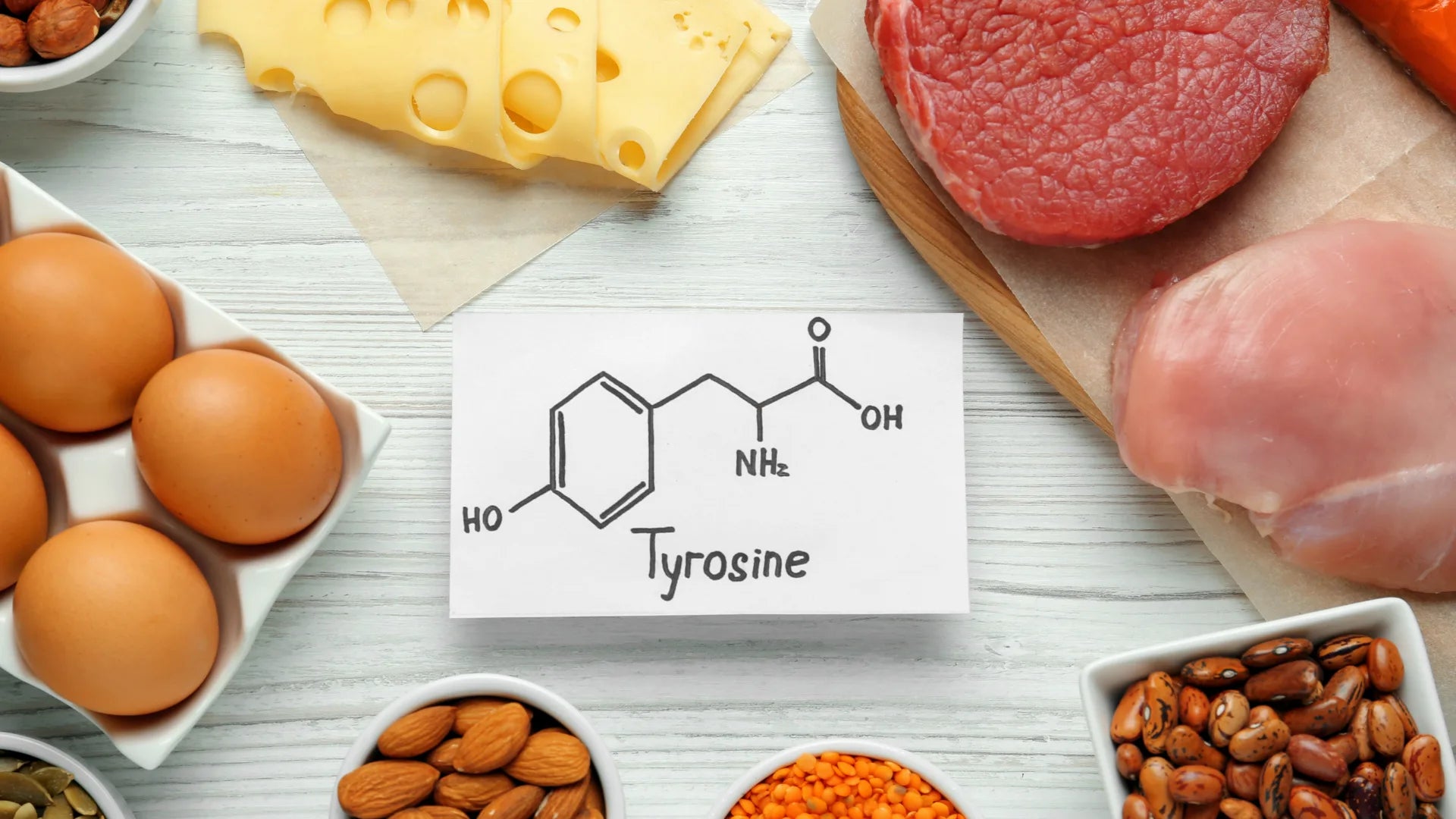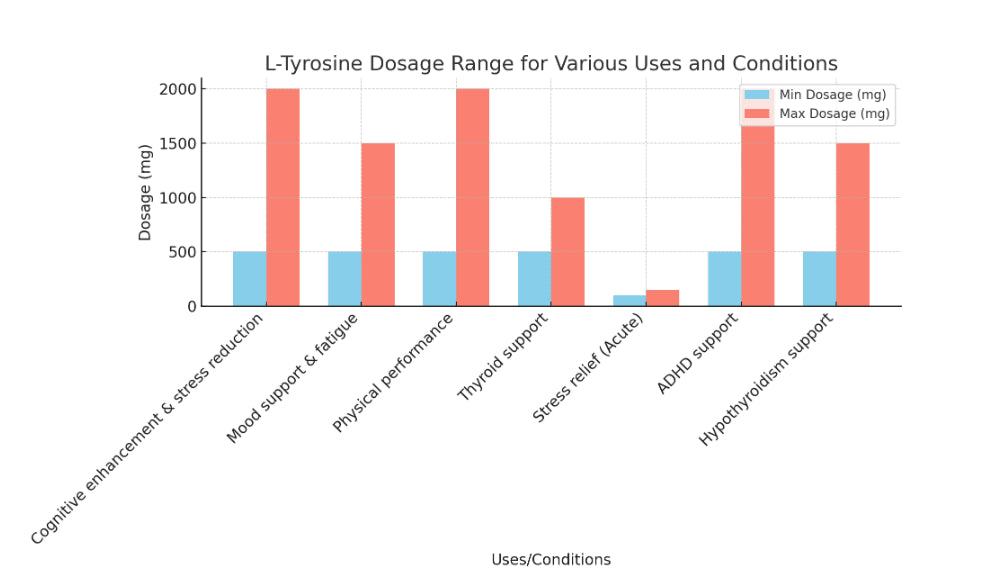
L-tyrosine is a non-essential amino acid that plays a critical role in producing several important substances in the body, including neurotransmitters, hormones, and pigments. L-tyrosine, often referred to as "tyrosine", is one of the 20 amino acids used by the body to synthesize proteins.
It is categorized as a "non-essential" amino acid, meaning that the body can produce it independently from another amino acid called phenylalanine. [1]
L-tyrosine is involved in producing key neurotransmitters such as Dopamine, norepinephrine (noradrenaline), and epinephrine (adrenaline). These neurotransmitters regulate mood, stress response, alertness, and concentration.
While the body can synthesize L-Tyrosine, it is also obtained from food sources. High-protein foods are typically rich in L-tyrosine, including Meat, poultry and fish, eggs, dairy products (such as cheese and yogurt), legumes, nuts, and seeds (especially almonds and pumpkin seeds).
L-Tyrosine is present in the Miduty Triple Thyroid Care Supplement along with other potent ingredients like KSM-66 Ashwagandha, Organic Sea Kelp, Selenium, and Iodine.
Miduty Triple Thyroid Care supplement has 30 servings per container with the health expert recommending consumption of 2 capsules per day one after lunch and one after dinner with water.
With a focus on bioavailability, Miduty's formulation is designed to help maintain balanced hormone levels, providing a reliable option for those looking to support their thyroid health. Miduty's L-Tyrosine supplements support sustained improvements in energy, cognitive clarity, and mood stability. This long-term support is essential for anyone dealing with chronic fatigue and brain fog linked to thyroid imbalances.
| Uses & Benefits | Description |
| Thyroid Health |
L-tyrosine plays a role in the production of thyroid hormones, particularly triiodothyronine (T3) and thyroxine (T4), which regulate metabolism, energy production, and growth. In individuals with mild hypothyroidism (an underactive thyroid), L-Tyrosine supplementation can help improve energy levels and metabolism by supporting thyroid hormone production. It can be beneficial in conjunction with other thyroid-supporting nutrients like iodine and selenium. |
| Boosting Metabolism |
L-tyrosine is an amino acid that boosts metabolism by supporting the production of thyroid hormones, which regulate the body's metabolic rate and ensure efficient calorie conversion into energy. By promoting healthy thyroid function, L-tyrosine enhances fat-burning and energy expenditure. It also aids in the synthesis of neurotransmitters like norepinephrine, which improve energy levels and exercise performance. This increase in physical activity further stimulates metabolism, making L-tyrosine beneficial for supporting metabolic health and weight management. |
| Attention Deficit Hyperactivity Disorder (ADHD) |
L-tyrosine has gained attention for its potential benefits in managing ADHD symptoms. ADHD is often characterized by low levels of dopamine, which affects focus, attention, and impulse control. [2] By boosting dopamine levels, L-Tyrosine may help improve focus and concentration in individuals with ADHD. People use L-Tyrosine as a natural, non-stimulant alternative to conventional ADHD medications. While not as potent, L-Tyrosine can provide mild support for managing symptoms. |
| Skin Health |
L-tyrosine is essential for the production of melanin, the pigment that gives skin, hair, and eyes their color. It can be beneficial for individuals looking to boost melanin production. [3] In conditions like vitiligo, where melanin production is compromised, L-Tyrosine may support increased melanin production. |
| Cognitive Enhancement |
L-Tyrosine is popular for its ability to improve mental performance, especially under stress or fatigue. It does this by boosting the production of catecholamines (dopamine and norepinephrine), which are essential for cognitive function. [4] L-Tyrosine helps maintain cognitive flexibility, memory, and problem-solving skills during stressful situations like sleep deprivation, extreme environments (e.g., cold or heat), or mentally taxing tasks. L-Tyrosine helps reduce "mental burnout" or brain fog, keeping you alert and focused. |
| Stress Reduction |
L-tyrosine is known for its role in the body's stress response, as it aids in the production of norepinephrine and epinephrine, hormones that help the body cope with stress. [5] During periods of acute stress, the body's neurotransmitter levels can become depleted, leading to fatigue, cognitive decline, and mood disturbances. L-tyrosine supplementation can replenish these neurotransmitters, helping to manage stress more effectively. |
| Fatigue Reduction |
L-Tyrosine can combat both mental and physical fatigue. By supporting the production of norepinephrine, L-Tyrosine helps maintain energy levels, reducing the feeling of mental exhaustion. [6] This makes it valuable for individuals who engage in tasks requiring long hours of concentration or those undergoing intense training. Norepinephrine and epinephrine are crucial hormones produced by the adrenal glands during the body’s "fight or flight" response. [7] |

The adequate dosage of L-tyrosine can vary depending on age, health status, and specific needs.
1. General Adult Dosage:
2. Pregnancy and Breastfeeding: Avoid using L-tyrosine supplements during pregnancy and breastfeeding.
3. Specific Health Conditions:
1. For Cognitive Performance: Take 30-60 minutes before mentally demanding tasks or stressful events.
2. For Stress Reduction: Take it in the morning or before stressful situations.
3. For Physical Performance: Take 30-60 minutes before exercise to enhance endurance and reduce fatigue.
4. For Mood Support: Take in the morning to promote a balanced mood and energy throughout the day.
5. For Thyroid Health: Take in the morning or as recommended by your healthcare provider for optimal thyroid support.
In summary, L-tyrosine is a vital non-essential amino acid that plays a significant role in various physiological functions, including neurotransmitter synthesis, hormone production, and skin pigmentation. The diverse L-tyrosine benefits encompass support for thyroid health, cognitive enhancement, stress reduction, and fatigue management. Additionally, its involvement in melanin production makes it essential for skin health.
While L-tyrosine is available through food sourceslike chicken, salmon, tuna, eggs, nuts and seeds (almonds, pumpkin and sesame seeds), yogurt, beans, lentils. Also supplementation may be beneficial for those experiencing specific deficiencies or heightened stress levels.
It's important to be aware of potential L-tyrosine side effects, which may include gastrointestinal upset, headaches, or fatigue in some individuals. Consulting with a healthcare provider before starting any new supplement is advisable to ensure it aligns with individual health needs and conditions.
Whether you are exploring L-tyrosine uses for mental performance, stress management, or skin health, this amino acid can be a valuable addition to your wellness routine.
| Sr. No. | Reference |
|---|---|
| 1. | |
| 2. | |
| 3. | |
| 4. | |
| 5. | |
| 6. | |
| 7. | Physiology, Noradrenergic Synapse - StatPearls - NCBI Bookshelf |
